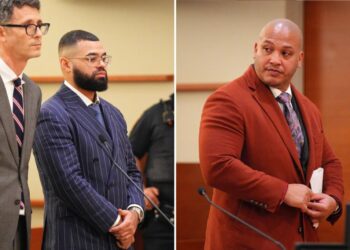When I was growing up, my family routinely told me to “give Grandma a kiss” or “hug your uncle goodbye.” At the time, I never resisted these directions—or even thought all that much about them; to do so would have been impolite.
Many parents today, though, are taking a different approach: Hugs and kisses are not required. Neither is sitting on someone’s lap, or being tickled, cuddled, or picked up when you don’t want to be. These parents believe that kids don’t owe anyone physical affection, and that they have the right to say no—or to offer a high five or fist bump instead.
By teaching children that they can choose whom they hug, parents hope to instill in them a sense of agency, and remind them that consent matters, both for themselves and for other people. But in some families, these new rules have caused friction—especially with grandparents.
Last year, the Washington Post advice columnist Carolyn Hax addressed a grandma who was hurt when her 7-year-old granddaughter began rebuffing her hugs. (Hax had little sympathy, telling the writer that forcing hugs should be “unthinkable.”) On Reddit, parents vent about grandparents who insist on physical affection even when kids say no. The parents I spoke with told me about grandparents saying things like “I’m gonna steal a hug” and “Where’s my huggy-huggy?” while their grandchildren recoiled from their open arms. Becky Kennedy, the psychologist and parenting influencer best known as “Dr. Becky,” told me that she comes across this issue “all the time.” Grandparents might interpret the rules as “rejecting or rude,” she said, but parents are merely trying to teach kids that “connection and love do not require you to ignore your own needs.” And that generational divide isn’t always easy to overcome.
In the late 2010s, as the #MeToo movement brought discussions about sexual assault into the mainstream, conversations among parents about consent picked up momentum. Talking to kids about bodily autonomy is nothing new, but the cultural context gave the dialogue a new level of urgency. Andrea Bastiani Archibald, a psychologist and former Girl Scouts executive, told me that around that time, the Girl Scouts began fielding lots of questions regarding how to teach girls about agency, and wound up issuing guidance for parents. “Telling your child that she owes someone a hug either just because she hasn’t seen this person in a while or because they gave her a gift,” the organization’s website says, “can set the stage for her questioning whether she ‘owes’ another person any type of physical affection.”
That line of thinking gained credence among more people as COVID highlighted the importance of asking before touching or getting close to someone. And it has continued to resonate with parents who embrace child-rearing philosophies that emphasize validating children’s feelings. Much gentle-parenting advice, for example, explicitly recommends giving children choices—so asking whether a kid wants a hug or a high five naturally fits into that framework.
[Read: The unspoken wedge between parents and grandparents]
Still, putting this into practice with family members who grew up with different norms can be complicated. Grandparents might argue that urging a grandchild to hug them won’t ruin that kid’s childhood. (After all, they might say, I was told to hug my grandparents, and I turned out fine.) But there is truth to the idea that, as Archibald told me, over time, those “micro-moments” can teach kids that what they’re feeling in their body doesn’t matter. And, for some families, counteracting that message begins at home.
The goal isn’t to discourage hugs—many parents I’ve spoken with say their kids are eager to embrace their friends and family. The children just want to do so on their own terms. Sometimes they need time to warm up to their grandparents after a long period apart. Jennifer Cannon, a grandmother in Harrison Township, New Jersey, said that her 2- and 5-year-old grandkids sometimes hesitate around her when she first comes to visit, but usually it takes only a day before “they’re climbing all over me and we’re snuggling.” In other cases, grandparents might find they’re getting fewer hugs and more high fives. But, as multiple grandparents told me, if the hugs do happen, they carry more weight—because, unlike the embraces of obligation doled out in earlier generations, these feel real.
To a certain degree, a little resistance to the new rules of family affection may be inevitable. Generational clashes in parenting are age-old, and some grandparents are bound to take any changes in caregiving patterns as a “criticism or an affront to how they did things,” Kennedy told me. These clashes may be especially heated in the age of intensive parenting, in which some parents intently monitor not only their kids but also anyone who spends time with them—grandparents included.
The result in many families, Kerry Byrne, the founder of the Long Distance Grandparent, a business focused on helping grandparents build relationships with their grandchildren, told me, is a whole lot of rules for grandparents to follow. The strictures govern what gifts kids are allowed, the foods they can eat, the words to use around them (and those to avoid), the schedule to adhere to, screen-time limits (if screen time is allowed)—and, now, how to greet their grandchild. She said she worries that some parents have “gone wild with boundaries,” and that many grandparents are “grandparenting on eggshells.”
Parents can run the risk of overcorrection. Navigating so many rules can be confusing and “emotionally wearing” for grandparents, Byrne told me. And Anita Stewart, a psychologist and parenting expert, told me that focusing too much on consent and giving people space could hint to children that physical touch is something to avoid. She worries that repeatedly asking if kids want to hug someone could “create a problem that wouldn’t have been there otherwise.” Maybe the child does want to hug Grandma, she said, but now feels like that’s the wrong choice. But as long as parents let kids take the lead, she told me, there doesn’t seem to be a risk of children internalizing the wrong message.
[Read: One obvious, underused child-care solution]
Most grandparents want to do what’s best for their grandkids, but they don’t always know what that is. Parents aren’t always the best at explaining the logic behind their rules, DeeDee Moore, the founder of the grandparenting website More Than Grand, told me. Moore said, for instance, that she once heard from a grandma who “felt like she was being asked to do something unnatural” in asking her grandchild for a hug. But when Moore told the grandma why it was important to respect children’s bodily autonomy, the grandma’s attitude changed. “That makes so much sense,” she told Moore. “I wish my daughter had told me why.”
Even when grandparents do understand the rules, it can take time to change old habits. When Wendy Leccese, a grandmother in Mooresville, North Carolina, heard from her daughter that she would need to start asking her grandson for hugs, she understood the reasoning right away. But actually following the rule took a bit of an adjustment, she said: Her husband would try to cajole their 3- and 5-year-old grandsons into giving hugs, and their daughter had to step in and remind him to not pressure them. Leccese herself still sometimes automatically goes in for a hug, but she’s learned to back off when she feels her grandson’s body tense up. Ultimately, she told me she’s proud of her daughter’s generation for teaching children that they have power over their own body, something she never felt as a girl.
Of course, the possibility of kids saying no might be painful for some grandparents. Byrne told me that a common reaction from the grandparents she counsels is: “Wow, it’s really hard when the child chooses a high five over a hug.” Some parents told me they struggled with a sense of rejection too. Hillary Lopes, a mom of 7-year-old triplets in New York’s Hudson Valley region, said that when one of her sons said he didn’t want to be kissed on the lips anymore, “it broke my heart in a small way.” But alongside her tenderness was pride: She was happy he felt comfortable telling her that.
The post The Family Hug Standoff appeared first on The Atlantic.




